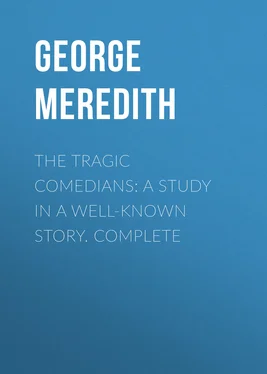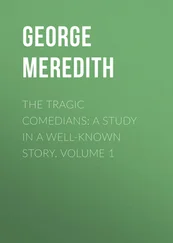George Meredith - The Tragic Comedians - A Study in a Well-known Story. Complete
Здесь есть возможность читать онлайн «George Meredith - The Tragic Comedians - A Study in a Well-known Story. Complete» — ознакомительный отрывок электронной книги совершенно бесплатно, а после прочтения отрывка купить полную версию. В некоторых случаях можно слушать аудио, скачать через торрент в формате fb2 и присутствует краткое содержание. Жанр: foreign_dramaturgy, literature_19, Драматургия, foreign_antique, foreign_prose, на английском языке. Описание произведения, (предисловие) а так же отзывы посетителей доступны на портале библиотеки ЛибКат.
- Название:The Tragic Comedians: A Study in a Well-known Story. Complete
- Автор:
- Жанр:
- Год:неизвестен
- ISBN:нет данных
- Рейтинг книги:4 / 5. Голосов: 1
-
Избранное:Добавить в избранное
- Отзывы:
-
Ваша оценка:
- 80
- 1
- 2
- 3
- 4
- 5
The Tragic Comedians: A Study in a Well-known Story. Complete: краткое содержание, описание и аннотация
Предлагаем к чтению аннотацию, описание, краткое содержание или предисловие (зависит от того, что написал сам автор книги «The Tragic Comedians: A Study in a Well-known Story. Complete»). Если вы не нашли необходимую информацию о книге — напишите в комментариях, мы постараемся отыскать её.
The Tragic Comedians: A Study in a Well-known Story. Complete — читать онлайн ознакомительный отрывок
Ниже представлен текст книги, разбитый по страницам. Система сохранения места последней прочитанной страницы, позволяет с удобством читать онлайн бесплатно книгу «The Tragic Comedians: A Study in a Well-known Story. Complete», без необходимости каждый раз заново искать на чём Вы остановились. Поставьте закладку, и сможете в любой момент перейти на страницу, на которой закончили чтение.
Интервал:
Закладка:
Then again, could that face be the face of a Jew? She feasted. It was a noble profile, an ivory skin, most lustrous eyes. Perchance a Jew of the Spanish branch of the exodus, not the Polish. There is the noble Jew as well as the bestial Gentile. There is not in the sublimest of Gentiles a majesty comparable to that of the Jew elect. He may well think his race favoured of heaven, though heaven chastise them still. The noble Jew is grave in age, but in his youth he is the arrow to the bow of his fiery eastern blood, and in his manhood he is—ay, what you see there! a figure of easy and superb preponderance, whose fire has mounted to inspirit and be tempered by the intellect.
She was therefore prepared all the while for the surprise of learning that the gentleman so unlike a Jew was Alvan; and she was prepared to express her recordation of the circumstance in her diary with phrases of very eminent surprise. Necessarily it would be the greatest of surprises.
The three, this man and his two of the tribe, upon whom Clotilde’s attention centred, with a comparison in her mind too sacred to be other than profane (comparisons will thrust themselves on minds disordered), dropped to the cushions of the double-seated sofa, by one side of which she cowered over her wool-work, willing to dwindle to a pin’s head if her insignificance might enable her to hear the words of the speaker. He pursued his talk: there was little danger of not hearing him. There was only the danger of feeling too deeply the spell of his voice. His voice had the mellow fulness of the clarionet. But for the subject, she could have fancied a noontide piping of great Pan by the sedges. She had never heard a continuous monologue so musical, so varied in music, amply flowing, vivacious, interwovenly the brook, the stream, the torrent: a perfect natural orchestra in a single instrument. He had notes less pastorally imageable, notes that fired the blood, with the ranging of his theme. The subject became clearer to her subjugated wits, until the mental vivacity he roused on certain impetuous phrases of assertion caused her pride to waken up and rebel as she took a glance at herself, remembering that she likewise was a thinker, deemed in her society an original thinker, an intrepid thinker and talker, not so very much beneath this man in audacity of brain, it might be. He kindled her thus, and the close-shut but expanded and knew the fretting desire to breathe out the secret within it, and be appreciated in turn.
The young flower of her sex burned to speak, to deliver an opinion. She was unaccustomed to yield a fascinated ear. She was accustomed rather to dictate and be the victorious performer, and though now she was not anxious to occupy the pulpit—being too strictly bred to wish for a post publicly in any of the rostra—and meant still less to dispossess the present speaker of the place he filled so well, she yearned to join him: and as that could not be done by a stranger approving, she panted to dissent. A young lady cannot so well say to an unknown gentleman: ‘You have spoken truly, sir,’ as, ‘That is false!’ for to speak in the former case would be gratuitous, and in the latter she is excused by the moral warmth provoking her. Further, dissent rings out finely, and approval is a feeble murmur—a poor introduction of oneself. Her moral warmth was ready and waiting for the instigating subject, but of course she was unconscious of the goad within. Excitement wafted her out of herself, as we say, or out of the conventional vessel into the waves of her troubled nature. He had not yet given her an opportunity for dissenting; she was compelled to agree, dragged at his chariot-wheels in headlong agreement.
His theme was Action; the political advantages of Action; and he illustrated his view with historical examples, to the credit of the French, the temporary discredit of the German and English races, who tend to compromise instead. Of the English he spoke as of a power extinct, a people ‘gone to fat,’ who have gained their end in a hoard of gold and shut the door upon bandit ideas. Action means life to the soul as to the body. Compromise is virtual death: it is the pact between cowardice and comfort under the title of expediency. So do we gather dead matter about us. So are we gradually self-stifled, corrupt. The war with evil in every form must be incessant; we cannot have peace. Let then our joy be in war: in uncompromising Action, which need not be the less a sagacious conduct of the war.... Action energizes men’s brains, generates grander capacities, provokes greatness of soul between enemies, and is the guarantee of positive conquest for the benefit of our species. To doubt that, is to doubt of good being to be had for the seeking. He drew pictures of the healthy Rome when turbulent, the doomed quiescent. Rome struggling grasped the world. Rome stagnant invited Goth and Vandal. So forth: alliterative antitheses of the accustomed pamphleteer. At last her chance arrived.
His opposition sketch of Inaction was refreshed by an analysis of the character of Hamlet. Then he reverted to Hamlet’s promising youth. How brilliantly endowed was the Prince of Denmark in the beginning!
‘Mad from the first!’ cried Clotilde.
She produced an effect not unlike that of a sudden crack of thunder. The three made chorus in a noise of boots on the floor.
Her hero faced about and stood up, looking at her fulgently. Their eyes engaged without wavering on either side. Brave eyes they seemed, each pair of them, for his were fastened on a comely girl, and she had strung herself to her gallantest to meet the crisis.
His friends quitted him at a motion of the elbows. He knelt on the sofa, leaning across it, with clasped hands.
‘You are she!—So, then, is a contradiction of me to be the commencement?’
‘After the apparition of Hamlet’s father the prince was mad,’ said Clotilde hurriedly, and she gazed for her hostess, a paroxysm of alarm succeeding that of her boldness.
‘Why should we two wait to be introduced?’ said he. ‘We know one another. I am Alvan. You are she of whom I heard from Kollin: who else? Lucretia the gold-haired; the gold-crested serpent, wise as her sire; Aurora breaking the clouds; in short, Clotilde!’
Her heart exulted to hear him speak her name. She laughed with a radiant face. His being Alvan, and his knowing her and speaking her name, all was like the happy reading of a riddle. He came round to her, bowing, and his hand out. She gave hers: she could have said, if asked, ‘For good!’ And it looked as though she had given it for good.
CHAPTER IV
‘Hamlet in due season,’ said he, as they sat together. ‘I shall convince you.’
She shook her head.
‘Yes, yes, an opinion formed by a woman is inflexible; I know that: the fact is not half so stubborn. But at present there are two more important actors: we are not at Elsinore. You are aware that I hoped to meet you?’
‘Is there a periodical advertisement of your hopes?—or do they come to us by intuition?’
‘Kollin was right!—the ways of the serpent will be serpentine. I knew we must meet. It is no true day so long as the goddess of the morning and the sun-god are kept asunder. I speak of myself, by what I have felt since I heard of you.’
‘You are sure of your divinity?’
‘Through my belief in yours!’
They bowed smiling at the courtly exchanges.
‘And tell me,’ said he, ‘as to meeting me…?’
She replied: ‘When we are so like the rest of the world we may confess our weakness.’
‘Unlike! for the world and I meet and part: not we two.’
Clotilde attempted an answer: it would not come. She tried to be revolted by his lording tone, and found it strangely inoffensive. His lording presence and the smile that was like a waving feather on it compelled her so strongly to submit to hear, as to put her in danger of appearing to embrace this man’s rapid advances.
Читать дальшеИнтервал:
Закладка:
Похожие книги на «The Tragic Comedians: A Study in a Well-known Story. Complete»
Представляем Вашему вниманию похожие книги на «The Tragic Comedians: A Study in a Well-known Story. Complete» списком для выбора. Мы отобрали схожую по названию и смыслу литературу в надежде предоставить читателям больше вариантов отыскать новые, интересные, ещё непрочитанные произведения.
Обсуждение, отзывы о книге «The Tragic Comedians: A Study in a Well-known Story. Complete» и просто собственные мнения читателей. Оставьте ваши комментарии, напишите, что Вы думаете о произведении, его смысле или главных героях. Укажите что конкретно понравилось, а что нет, и почему Вы так считаете.












